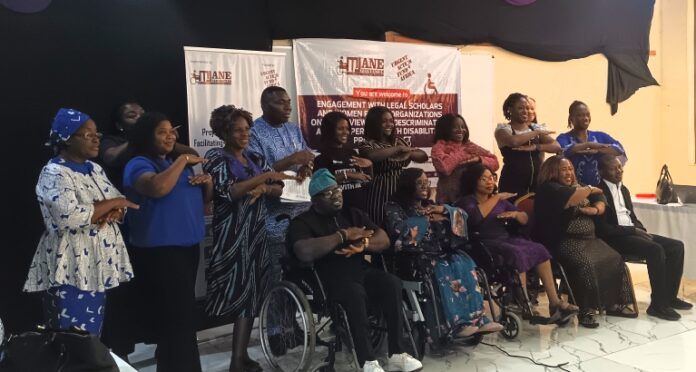On Tuesday in Abuja, the Mimijean Foundation for Women and Children with Disabilities spearheaded a crucial roundtable discussion aimed at addressing significant gaps in the Discrimination Against Persons With Disabilities (Prohibition) Act 2018, particularly regarding the inclusion of women with disabilities. The event brought together legal scholars, women’s rights organizations, and individuals with disabilities for a day of intensive brainstorming and dialogue.
In her opening remarks, Ambassador Beatrice Awala Mube, Executive Director of the Mimijean Foundation, warmly welcomed the participants and expressed her appreciation for their commitment to this vital cause. “This foundation is not about me; it’s about every person with disabilities in Nigeria,” Mube stated. “Our goal is to create a unified voice to tackle the numerous challenges facing persons with disabilities.”
Mube emphasized the meeting’s objective: to pinpoint gaps in the Disability Act concerning the inclusion of women and girls with disabilities, ensuring their interests are adequately captured in the ongoing review and amendment process. “This effort will help articulate the needs of women with disabilities, enshrining them in the Act and ensuring their involvement in its implementation,” she said. “The grace period is over. It’s time to hold the government accountable for the Act’s implementation. Unfortunately, the specific needs of women with disabilities were not captured in the original Act, which is why we have gathered experts and stakeholders to help identify these gaps and inform lawmakers in the review process.”
Dr. James David Lalu, Executive Secretary of the National Commission for Persons with Disabilities (NCPWD), represented by Nike Akinbola, Head of the Gender Unit, acknowledged the existing gaps in the Act. “The Commission recognizes the importance of including women with disabilities due to their unique challenges,” Akinbola noted. “That is why we have established a gender unit led by a woman with a disability.” He expressed his support for the ongoing efforts to review and amend the Act to better serve women with disabilities.
Aliyu Abdullahi, President of the Joint National Association of Persons with Disabilities (JONAPWD), represented by Uche, highlighted JONAPWD’s initiatives to enhance the capacity of women with disabilities through training programs. “As the Act has moved beyond its moratorium period and we are now pushing for implementation and compliance, it is crucial that the interests of women with disabilities are included in the review. Their voices must be present in the implementation process to ensure their issues are addressed,” Abdullahi emphasized.
Susan Kelechi, representing Grace Jerry, Executive Director of the Inclusive Friends Association (IFA), delivered a compelling goodwill message. She stressed the organization’s strong support for incorporating women’s rights into the Act. “Fifteen percent of Nigeria’s population consists of persons with disabilities and it is a huge number that should be taken serious. Women and children with disabilities who are in the majority of Disability Population in Nigeria must be taken seriously and their needs included in the Act to address the core issues they face,” Kelechi asserted.
Comrade Chris Agbo, Executive Director of The Qualitative Magazine, commended the Mimijean Foundation for organizing such a timely and essential meeting. “The drafters of the Disability Act in their wisdom didn’t insist on these issues to enable us have an Act, we can build on in future, providing an opportunity now to review and amend the Act to include more essential items. Women with disabilities face double discrimination due to their gender and disability, making it vital that their needs are included in the Act,” Agbo stated. He also pledged his platform’s support to promote the cause of women with disabilities in the review process.
Victoria Sani, representing Lois Auta, President of the Network for Women with Disabilities (NWD), highlighted the persistent discrimination faced by women with disabilities in accessing services in Nigeria. “Women with disabilities are excited about this initiative and will support the identified gaps by organizing peaceful protests to the National Assembly, advocating for their inclusion in the Act,” Sani declared.
Prof. Tamino Kabiru, from the Association of Legislative Drafters and Advocacy Practitioners, provided a critical perspective. He recalled his advice during the drafting of the Disability Act to adopt all contents of the United Nations Convention on the Rights of Persons with Disabilities (UNCRPD). “Had we annexed the entire treaty to the Act, we wouldn’t need these revisions now. For example, the Act’s failure to address the needs of PWDs in elections, a provision in the UNCRPD, was only realized prior to the 2019 elections,” Kabiru remarked.
Facilitator Barrister Uzoma Anaeto guided the participants through the Disability Act’s gender components using key indicators. She introduced the five principles of Inclusive Behaviour to underscore the importance of inclusion and led group discussions to identify gaps in different parts of the Act through a gender lens.
In her closing remarks, Cynthia Ukachi, Program Officer of the Mimijean Foundation, assured that the foundation would consolidate the points raised during the discussions and make substantive contributions to the review of the Disability Act in the National Assembly. “We will collaborate with all the organizations present to ensure the voices and needs of women with disabilities are fully represented,” Ukachi concluded.
The roundtable, organized with the support of Urgent Action Fund Africa, marked a significant step towards a more inclusive and comprehensive legal framework for persons with disabilities in Nigeria, particularly women and girls. This initiative sets the stage for meaningful legislative advancements and greater inclusion in the years to come.


